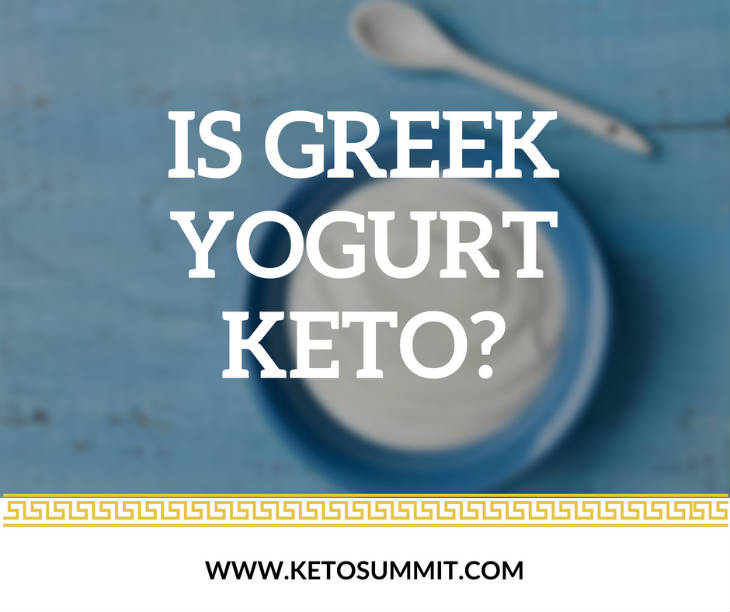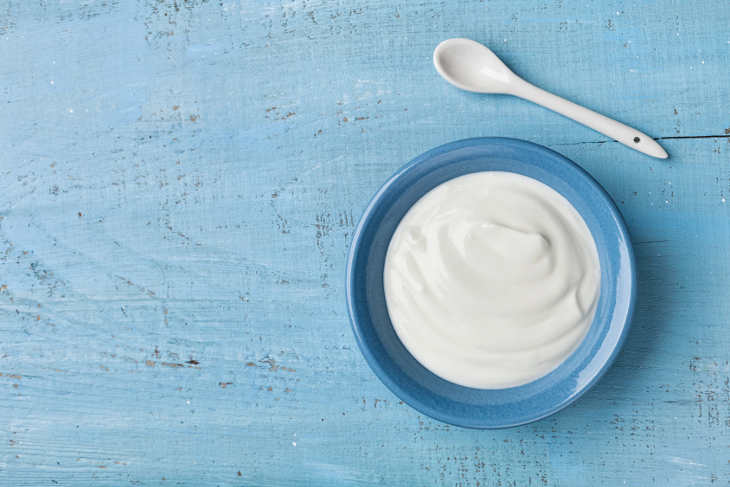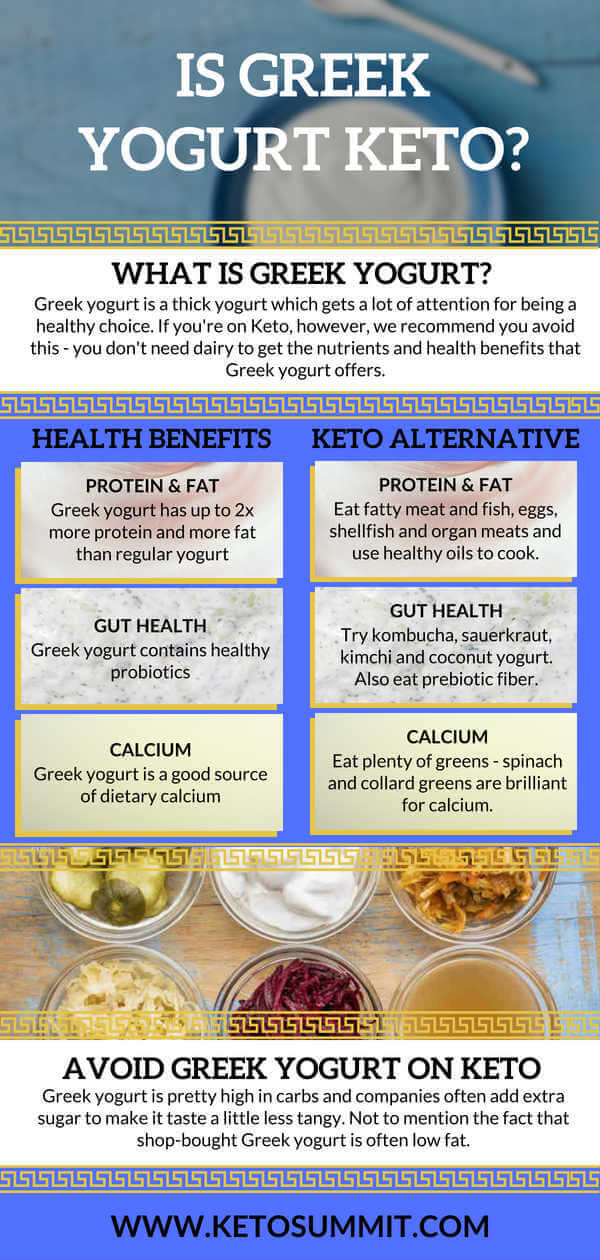Eating Greek Yogurt On Low Carb Diet
Greek yogurt has been touted as a superfood boasting many benefits over recent years, but we aren't so sure it holds up to those claims, especially if you're following a ketogenic diet.
Read on for our take on the controversial issue of yogurt on a Keto diet…

What is Greek Yogurt?
Fundamentally, there are few meaningful differences between regular yogurt and its Greek cousin.
To make yogurt, milk is heated and then cooled for the fermentation process. It is then cultured with bacteria or pre-made yogurt and allowed to ferment.
The difference between regular yogurt and Greek yogurt comes into play with what happens next.
For regular yogurt, the process stops here. It's now ready to refrigerate and eat.
Greek yogurt, on the other hand, must go through a bit more preparation before it's done.
After the yogurt is through fermenting, it's placed into a cloth made of fine mesh and allowed to strain for several hours. The liquid produced is called whey. The longer it's allowed to strain, the thicker the resulting Greek yogurt will be.
In the end, Greek yogurt will still have the tangy taste you'd expect from regular yogurt, but it will have a thicker consistency.
Over the last few years, you might have noticed that Greek yogurt is frequently advertised as a healthy food choice.
Why do people call it a healthy food, exactly?
Here are 5 reasons behind these claims…
- Protein: The process of straining the whey from yogurt results in a more concentrated final product. For this reason, Greek yogurt has up to 2x more protein than regular yogurt.
- Calcium: Studies show that adults who don't consume adequate amounts of calcium are prone to weak bones or osteoporosis. (3) Calcium is vital for the strength of the body's muscles and bones, and Greek yogurt is a good source of dietary calcium.
- Fat: Because Greek yogurt is denser than regular yogurt, the full-fat versions also have more fat than regular yogurt varieties, resulting in a creamier and more satisfying product.
- Lower-carb options: Though many varieties are sweetened with sugar or artificial sweeteners, plain Greek yogurt is typically free of these questionable ingredients. When you choose an unsweetened Greek yogurt, it will have roughly half the amount of carbs as regular yogurt.
- Gut health: Much research is being done on the microbiome – the collection of microorganisms that live in the human intestinal tract – and their effect on our health. (1) Many studies are pointing to the importance of probiotics to maintain good gut health. (2) Probiotics – microorganisms consumed for their beneficial effects – are found in fermented foods, including yogurt.
Probiotics in Greek yogurt vs. regular yogurt
For all these reasons, Greek yogurt is considered by many to be a healthy food. But when it comes to probiotics, is it any better than the regular yogurt on the store shelves?
The FDA indicates that in order to be considered yogurt, a product must contain one of two specific types of bacteria: Streptococcus thermophilus or Lactobacillus bulgaricus. (1) Aside from that, ingredients can and do vary widely for both regular and Greek yogurt.
So is one better than the other if you want to maximize the probiotic benefits? Not really, but you'll still have to read package labels to know what you're getting.
On a yogurt label you may see a seal that indicates the product has "live and active cultures". This means it contains at least 100 million cultures of live probiotics per gram of yogurt at the time of manufacture. (1)
On the other hand, the words "heat-treated" on the label suggest the yogurt was heated after being cultured, killing the beneficial cultures and eliminating any probiotic benefit.
So when it comes to probiotics, Greek yogurt and regular yogurt are about the same. However, you'll find quite a bit of variation from one brand to another in the quantity and variety of cultures used, as well as overall probiotic benefit.

So in general, there are nutrients in Greek yogurt that can help you improve overall health and peak performance. But is Greek yogurt the best way to get these nutrients?
And is Greek yogurt OK to eat if you're following a Keto diet?
Is Greek Yogurt Keto?
The short answer to this question is no, Greek yogurt does not get well with a ketogenic diet.
In fact, dairy, in general, generates a deal of controversy in the ketosphere.
This might be confusing, especially since the typical internet search for Keto recipes leads to an onslaught of tempting meals featuring various kinds of dairy.
We believe you should avoid Greek yogurt and most, if not all, other kinds of dairy.
Let's examine some of the reasons you might want to avoid Greek yogurt on a Keto diet.
Dairy Intolerance
Though many agencies and programs try hard to convince you that dairy products are essential for your health and wellness, this simply doesn't hold true for everyone.
Lactose intolerance is surprisingly common, with 30 million Americans experiencing it by the time they are 20 years old. (4) And milk – the main ingredient in yogurt – has been identified by the FDA as one of the 8 Major Food Allergens. (5)
Some people have sensitivities and intolerances to lactose, whey, casein, and other dairy proteins, and they don't even know it. When they abstain from dairy products for a period of time they are often surprised to find certain health problems and ailments are completely relieved.
It's Easy to Overeat
If you're a fan of cheese, you know how hard it can be to stop after eating a single 1-oz serving.
This is because even small portions of dairy products tend to be high in calories. Around here we generally focus on macros rather than calories, but if you're looking to lose weight, dairy can easily derail your progress.
Unwanted Ingredients
Beyond this, certain types of milk or other dairy have unwanted ingredients that just aren't healthy. Some cows are fed growth hormones to produce more milk, though this has reduced significantly in recent years due to public outcry. (6)

Dairy products often contain other unwanted additives too, like carrageenan, cellulose gum, guar gum, and artificial sweeteners and flavorings.
High Carbohydrate Content
Take a glance at the nutritional values of Greek yogurt and you may be surprised. Yogurt tends to be quite high in carbohydrates.
On a ketogenic diet, you're keeping your total carb intake down to 25g a day. A small cup of plain yogurt at around 6g of carbohydrate could really throw things off.
And if you've ever had a spoonful of plain Greek yogurt, you might understand why companies feel the need to add sugars and other ingredients to make it taste better. Additional carbs and sugars are often added, or else suspicious sugar substitutes. (7)
Let's look at a couple of examples.
One popular brand of Greek yogurt is made with only whole milk, cream and live active yogurt cultures. A 7 oz. container has 10g of fat, 18g of protein, and 6g of carbohydrates.
And by the way, those carbs are all sugars found naturally in milk – this is one of the better brands that includes "no added sugars".
And maybe 6g of carbs isn't too bad. But keep in mind, this is plain yogurt we're talking about. What if you want flavored or sweetened yogurt?
The same brand also makes a product that combines their Greek yogurt with fruit, still with "no added sugar". A 5.3 oz serving of the strawberry variety contains 2.5g of fat, 13g of protein, and a whopping 11g of carbohydrate (5g of which are sugar).
Do you really want to "spend" nearly half your daily carbs on a little cup of yogurt?
If that carb count doesn't deter you, the Greek yogurt you find in the store is usually low-fat. It's hard to find one compliant with the general guidelines of a Keto diet.
Is sugar-free Greek yogurt Keto?
Yogurt is made from milk that is fermented, and milk naturally contains a certain amount of sugar. In fact, an 8 oz. cup of milk contains about 12 grams of carbohydrate, all of which is sugar, in the form of lactose. (1)
When it's fermented, most of the lactose is converted to lactic acid, giving yogurt its tangy taste. This reduces the carb (and sugar) load in commercial yogurt, compared to milk.
So unless the yogurt is made with something other than cow's milk, it's going to contain carbs and sugar. It's unavoidable.
If you're looking for flavored or sweetened yogurt, you'll have to be very careful to avoid products that contain added sugars. It's important to be a diligent label-reader in this situation.
For example, the label of one leading brand of strawberry Greek yogurt indicates no added sugar, and stevia leaf extract is used as a sweetener. So far so good, but let's look at the nutritional content.
Even with zero calorie sweetener and no added sugar, a 5.3 oz serving contains 0g of fat, 15g of protein, and 10g of carbohydrate (5g of sugar). It's still too much carbohydrate (and too little fat!) to fit in well with a Keto diet.
There are brands that offer Greek yogurt made with "less sugar", but you're still looking at 11g of carbohydrate (9g of sugar) per 5.3 oz serving.
You could try an artificially-sweetened Greek yogurt to save a few grams of carbs. But at what cost? Sweeteners like aspartame and sucralose are actually associated with obesity, and can have unwanted side effects, including increased appetite and cravings for sweets. (1)
Hopefully, you can see clearly why we are not fans of Greek yogurt, and why we don't think it should be consumed while following a ketogenic diet.
What can you turn to instead, though?
Get The Same Benefits Of Greek Yogurt Without The Downsides
Even though Greek yogurt has many drawbacks, the advantages cannot be ignored.
Luckily, we've got some ideas to harness these benefits without experiencing all the disadvantages.
Protein and Fat
- You can get protein and healthy fats from many natural food sources like fatty meat and fish, eggs, shellfish, and organ meats.
- A great source of non-dairy protein is collagen, which also has many unexpected health benefits. You can read more about collagen here. We recommend CoBionic for collagen.
- There are many healthy ways to get the fats you need for health, energy, and satiety. In addition to animal fats, we love avocado oil, olive oil, coconut oil, and ghee.
Gut Health
- Including fermented foods in your diet is a great way to support your overall health. (9) There are many options – try kombucha, sauerkraut, kimchi, and coconut yogurt.
Fiber is a core element of any diet that helps promote proper digestion. Prebiotic fiber – food you eat that supports our microbiome – is necessary to keep your gut happy. You can find prebiotic fiber in many Keto-friendly food sources.

Calcium
- When you are eating plenty of veggies you can also count on getting your calcium. A cup of cooked collard greens has 268 mg of calcium, while the same amount of spinach has 256 mg. (For comparison, a 6-oz cup of plain full-fat Greek yogurt has 187 mg of calcium).
But what if you just really like yogurt? Well, you can try making and fermenting your own non-dairy yogurt! We'll explain how to do this below.
What To Use Instead Of Greek Yogurt
Because dairy is such a staple in most standard diets, it can be hard to know how to cook without it. Plus, a lot of mainstream Keto recipes rely on dairy as a core ingredient.
So how can you get past that and break through to improved health and successful weight loss?
First of all, check out this great list of Keto substitutes for dairy, including options for replacing butter, cream and cheese. When you're making dressings, dips, and smoothies, coconut milk or cream are excellent alternative ingredients.
As far as yogurt goes, making your own from coconut milk is far easier than you might think. Use your Instant Pot to make this coconut yogurt recipe.
If you're excited about this and looking forward to make your own keto-friendly yogurt, check out these 27 Yummy Keto Yogurt Recipes and find your own personal favorite.
Greek Yogurt: Just Say No!
With so many healthy, Keto-friendly ways to get the same benefits of Greek yogurt without the downsides of dairy, there's really no reason to keep using it.
Experiment with any of the above recipes instead and enjoy a dairy-free life while still staying true to your Keto diet.
Please pin the image below so that you and others can quickly and easily refer to the list and find out whether Greek yogurt should be included in their keto diet.
[Pinterest Image For Is Greek Yogurt Keto?]

Eating Greek Yogurt On Low Carb Diet
Source: https://ketosummit.com/is-greek-yogurt-keto/

0 komentar:
Posting Komentar